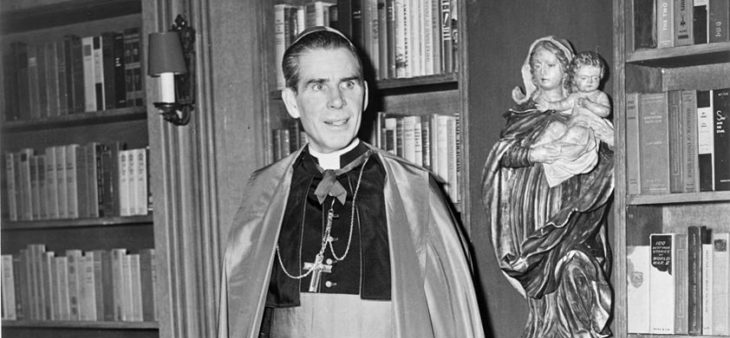Prayer drives out sin

By Venerable Archbishop Fulton Sheen
Editor’s Note: This reflection on the Eucharist by Venerable Fulton Sheen is part of a series by Catholic authors and saints that will be published by Catholic San Francisco Magazine as part of the National Eucharistic Revival.
One of the first effects of praying a daily holy hour will be to get rid of any evil that is in our life. Evil is not always to be overcome by combating it directly. St. Paul even suggests that certain types of mortification do not do away with certain sins.
How do we get rid of evil? By the expulsive power of a new affection. We do not drive out the evil, rather we crowd it out. We drive it out when we attack it directly. We crowd it out when we bring something else in. It’s like a man who leads an evil life until he meets a fine woman who leads him in the path of virtue. So St. Paul says: “Be not overcome by evil but overcome evil with good.”
How do we know for example that water is polluted? We know it from clean, clear water. Why are we shocked at bad grammar? Because we know good grammar. Why are we shocked at bad music? Because we know harmonious music.
Our spiritual life must not start with a deep consciousness of our guilt and sin. No. It is Christ that gives us a consciousness of guilt. He is first. Then we become aware of the fact that we have sinned against him.
Another reason for praying the holy hour is that we need power. Power is born of silence and presence. As the psalmist put it: “Be still and know that I am God.” In prayer, we shrug off the burdens of the world. We come in and spend an hour with the Lord and talk to him and listen and develop our senses of hearing and seeing and touching. Hearing: not doing all the talking. “Speak, Lord, thy servant heareth.” Not listen, Lord, they servant speaketh. And the Lord does talk to us.
Excerpted from “Through the Year with Fulton Sheen: Inspirational Readings for Each Day of the Year.” Compiled and edited by Henry Dieterich, Ignatius Press, 2003. Original edition, 1985, Servant Books.

